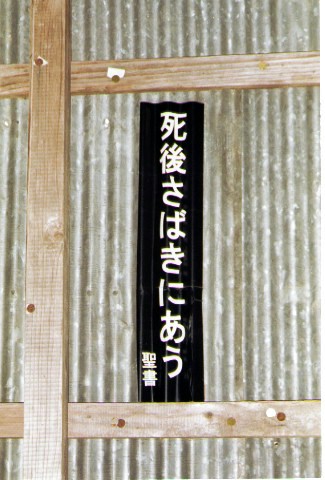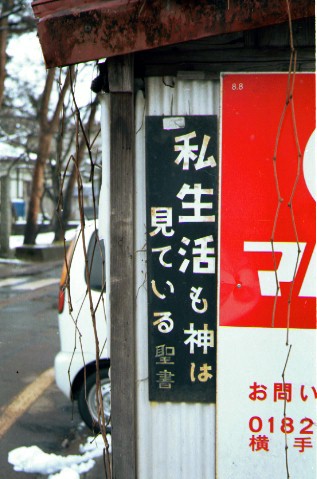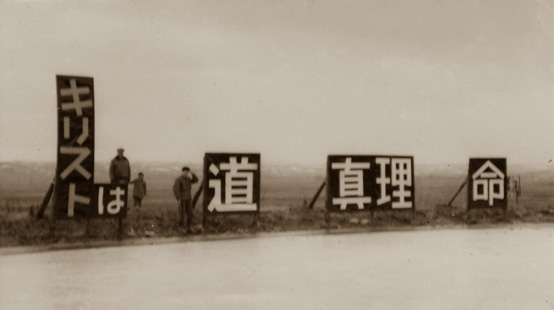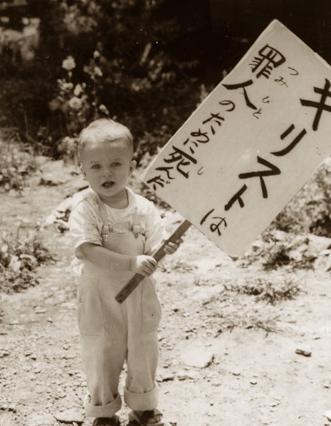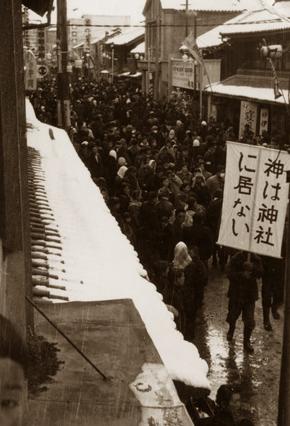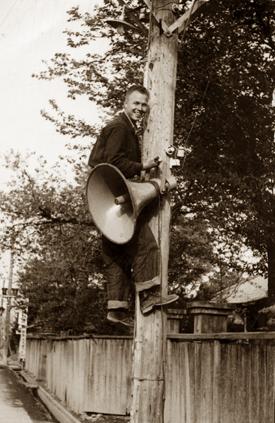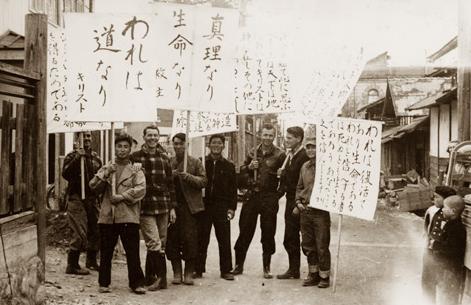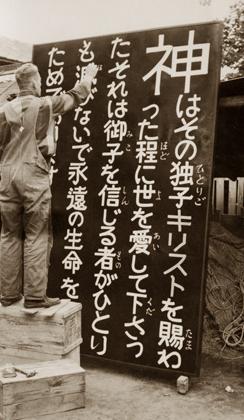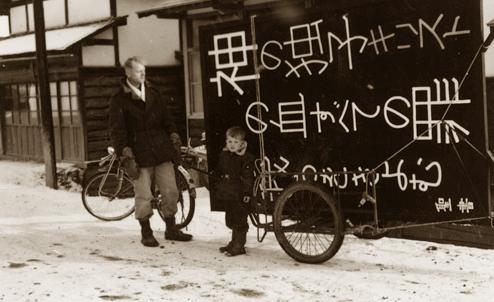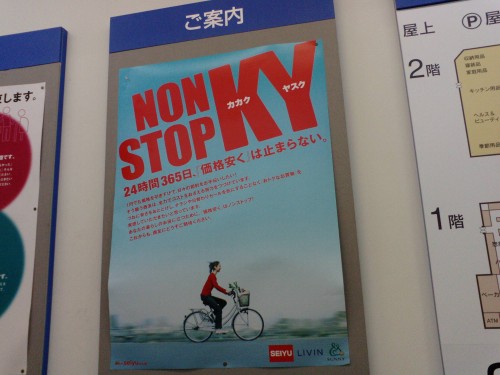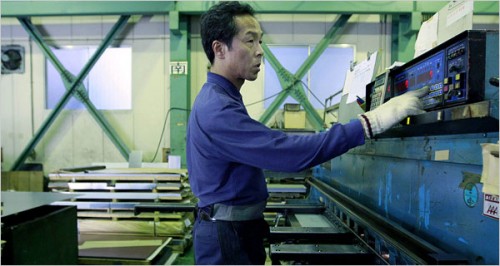 Google’s commemorative logos have become a tradition over the years starting from simple doodles to more complex pieces, as seen in this retrospective article. When doing a search just now, I noticed that Google has made the above special logo in honor of the 150th anniversary of the opening of the Port of Yokohama, which took 5 years after Commodore Matthew Perry signed the Convention of Kanagawa. While most Japan-resident readers of this blog will probably notice the special logo, it may very well only appear for users in Japan, so here ya go.
Google’s commemorative logos have become a tradition over the years starting from simple doodles to more complex pieces, as seen in this retrospective article. When doing a search just now, I noticed that Google has made the above special logo in honor of the 150th anniversary of the opening of the Port of Yokohama, which took 5 years after Commodore Matthew Perry signed the Convention of Kanagawa. While most Japan-resident readers of this blog will probably notice the special logo, it may very well only appear for users in Japan, so here ya go.
Category: Japan-US Relations
“After death cometh judgment” – Why are there so many Christian signs in provincial Japan?
(Updated mistranslation “regional” based on reader comment)
In his liveblog of Murakami’s new novel 1Q84, Daniel Morales of Howtojaponese challenged the folks at MFT to find something out for him (emphasis added):
17:03 Done with Chapter 12. No topics on the Aum yet, but religion does come up. Will be interesting to see where he takes it. One question I’d like to see someone answer (maybe someone at Mutantfrog?) is why do so many houses in Japan have signs with Christian quotes on the side? I haven’t seen too many in Tokyo, but they were all over the town where I spent three years. Always the same color pattern – dark brown with yellow lettering. They said things like “The blood of Christ forgives all” or “He died for our sins.” Can’t seem to find a picture anywhere. (Update: Matt provided this link in the comments.)
We at MFT love a good challenge, and thankfully this one wasn’t all that challenging. Thanks to Matt‘s link, I was able to Google my way to the name of the group responsible: It is the Miyagi-based “Bible Distribution Cooperation Society” a loosely organized association of Christians at least partly led by American missionaries. This is one of the same groups who uses soundtrucks and bullhorns in the Shinjuku station area to get out the message of Christ, so those in the know might not be surprised that these signs also come from the American missionaries.
The short answer to Daniel’s question is that this group asks the owners of the house or any other public facade to let them post the signs, and the owners say yes. What follows is the same answer in much more detail, but first let’s give a little background of what we are talking about in case some readers haven’t seen the signs.
The signs
So if you’ve never been to Japan or just not to a part of Japan where the signs are visible, let me clue you in – in various places, mostly in areas outside the major urban centers, you will often see signs that look something like this:
This one reads “After death cometh judgment- The Bible.” According to the site, it is posted on a bus stop near a middle school in Iwate Prefecture. Or this:
“God is watching, even in your private life – The Bible.” (Taken in Akita Prefecture). Or this:
“The wages of sin is death — The Bible” (Akita Prefecture)
(This site has LOTS more of the signs along with some Jack Chick-style pamphlets and a heaping helping of snarky commentary)
As you can see, they are written in white and yellow text on a black background in uneven, ransom-note fonts and usually contain the starkest of messages about what the God will do to you if you fail to accept Christ. If their intent is to scare the living crap out of people then they are remarkably effective as the signs are truly the stuff of nightmares (or at least a scene out of Carrie or The Texas Chainsaw Massacre). These are not the only public displays in Japan that appear to be judging you on the spot, but they are by far the creepiest I’ve seen. I just don’t understand the point of making these signs so creepy. If you want to make Christianity appealing wouldn’t you try and make people feel welcome instead of scolding them like this?
My personal encounters with the signs come during regular trips to visit inlaws in Tochigi Prefecture, near the Gunma border. Mrs. Adamu, her parents and I usually take backroads to avoid the high tolls, so we get to see several of these signs en route.
At any rate, the placement of these signs on cracked concrete structures and rusted out corrugated aluminum bus stops and storefronts reinforces the general theme of depression and stagnation that dominates the areas I’ve visited. Whenever I see another of these white-on-black reminders that God is watching, it makes me wonder if it is meant as a protest against all the rust and malaise of Tochigi and Gunma.
The group
Now that we know what these signs are, let’s try and answer the next question: who is doing this and why?
According to Wikipedia, these signs are mainly the work of the Bible Distribution Cooperation Society, founded around 1950 in part by an American ex-soldier named Paul Broman who has dedicted his life to spreading the word of God using this unusual method. According to this now-defunct blog of a Japanese Christian minister, Broman took Japanese citizenship in 1970 and funds the activities of the group through his IT services business GrapeCity Inc (UPDATE: Though Broman would be about 82 right now, I haven’t seen an obituary anywhere so I assume he is still alive). According to the group’s website, they initially started their activities in Iwate and Aomori but in the late 1950s expanded internationally. According to Wikipedia, other activities of the group include sound trucks (you may have heard them in Shinjuku) and a Christian school based in Miyagi. They are an independent evangelist group not affiliated with Mormons, Unification Church or any other of the major groups.
Also according to Wikipedia, the signs are posted with the permission of the building/structure owners, and often they are neither a member of the association nor even Christian. They simply allow their real estate to be used for ads, similar to political posters and some other ad schemes, though apparently the association is either not allowed or does not offer to pay in exchange for the permission.
(An aside: This willingness to ugly up the neighborhood I think speaks to the owners’ complete lack of anything resembling taste or the basic decency to maintain an appealing public space. The towns, for their part, also seem to have no interest in keeping their neighborhoods nice. I am sure someone will tell me to shut up and stop making Alex Kerr-style arguments to legislate taste, but in cases like this I have to side with those who’d rather see fewer eyesores)
The association’s official homepage, true to its funder’s background, is well-designed and contains a lot of information, though an uninformed viewer might not immediately recognize that this is the group behind the odd signs and the loud, judgmental announcements in Shinjuku (I’ll accept that maybe the cartoon sound truck at the top of the page gives it away).
On the “About” page, the group’s stated objective is to “directly communicate the word of The Bible” (「聖書のことば」をそのまま伝える」). Their listed activities are distribution of free literature at primary/middle/high schools, “broadcasting” the word of The Bible in areas where many people congregate, individual proselytizing by Christians, and communication of the word of The Bible on placards and signs. They are not a membership organization and do not solicit members. Though the group lends “mutual help” and coordination, each member is individually responsible for his or her activities. Wikipedia indicated that there are apparently other groups who are not affiliated with the original society who have imitated their style. Based on this mission statement I don’t think they would mind imitators.
The group’s activities are completely self-funded and seek no charity. They boast that they have distributed 60 million Bibles to 18 countries throughout their history. They claim to pass out 1 million Bibles in Japan each year.
It is hard to know how many people are involved with these efforts. I am still waiting for an email response from an affiliated group, the Church and Home Educators Association Japan (CHEA Japan). For reference, various estimates count between 1 and 3 million of Japan’s people as at least nominally Christian. Protestants, for their part, comprise around half a million or 0.4% of the population (this is a Wikipedia figure apparently taken from Adherents.org. Like all such estimates it is probably pretty unreliable).
Vintage evangelism
The site also features a photo gallery of the group’s work that includes some vintage signs (unfortunately undated!). Some of these are really cool so I’ll post the best of them:
“Jesus is the way, truth, life.”
“Christ died for the sinners.”
“God is not in the shrine.”
“After death cometh judgment.”
Front: “I am the way.”
John 3:16 – “For God so loved the world, that he gave his only begotten Son, that whosoever believeth in him should not perish, but have everlasting life.”
“The blood of Christ, God’s only son, purifies all our sins – The Bible.”
There are lots more on the site, so I advise you to check them out!
Fun with Christian signs
These signs have become something of an underground social phenomenon due their sheer ubiquity (in Japanese some refer to them as キリスト看板 or roughly “those Christian signs”). One site (linked from Wikipedia) lets you create your own scary signs in HTML. Here is my version of Nietsche’s “God is dead” quote:
| ニ | チ ェ |
神 は 死 ん だ |
KY: Not what Seiyu thinks it means
Seiyu is a discount supermarket/general retail store that’s owned and operated by Walmart. Since first investing in the chain in 2002 and eventually taking a 95% stake, Walmart has reportedly never managed to make the stores profitable. I am not here to judge why that might be, but today shopping there I came across some evidence of why they might be having trouble making headway in the Japan market:
The letters KY are apparently intended to stand for “kakaku yasuku” (low prices), which would make the whole phrase “non-stop low prices” a translation of Walmart’s “Everyday Low Prices” slogan into Japanized English. Ironically enough, someone must not have realized that “KY” in Japan was last year’s buzzword and literally means failing to respond appropriately to the situation at hand.
Since a couple was joking about it on their way in, I can be sure I wasn’t the only one in on the joke.
Is Yukio Hatoyama a “9-11 Truth” believer? 鳩山民主党代表は9・11陰謀論者なのか
Since this message is partly intended for a Japanese audience, I’ll start in that language:
陰謀論者で知られるジャーナリストのベンジャミン・フルフォードは、最近のブログで「民主党代表の鳩山由紀夫氏は最近911真実追究イベントに出席をしていた。」と述べている。普通はお笑いとしてしか読まないベンさんだが、今回の主張が正しいとすれば、これは大変なことになると考え、調べることにした。すると何と本当に「911真実追究イベント」に出席していた! (当時も日本人のブログでこのイベントを取り上げた)
そのイベントとは、今年4月に参議院の外交防衛委員会で延々と9・11陰謀説を語ったことで有名な開催者の藤田議員参院議員(民主党)の著書「9.11テロ疑惑国会追及―オバマ米国は変われるか」の出版記念イベントで、鳩山さん(当時は民主党幹事長)がただ出席しただけでなく、演説も行った上に、次のように藤田さんの活動にエールを送っている。
鳩山さんは、このテロとの戦いの原点の追求の意義を述べると共に、入り口で「身辺をくれぐれも注意して下さい」と私に訴えた青年に応えるように、「命をかけても取り組む覚悟はありますよね!」と私の決意を確認して下さいました。
ご存知のように、9・11陰謀論はトンデモナイ話である。アメリカ政府による陰謀だと主張するものはごく一部の人たちだし、もし陰謀だとすれば、被害者や研究者などありえないぐらい何千人もの人たちが加担していることになる。「歴史とは勝者が紡ぐものに過ぎない」や「歴史とは、合意の上に成り立つ作り話以外の何物でもない」などの名言があるが、今回はそういう主張は当てはまらない。なぜなら、ネットを通じて世界がつながっている今、「敗者」も歴史を書くことが可能になったからだ。もしこのような陰謀説が正しいとすれば、アメリカの敵国が大きく取り上げるに違いない。もっとも、被害者の遺族がこのような陰謀説を信じるなら、彼らが大きな力を持っているので、耳を傾けてくれる人も多いはず。しかし、被害者の遺族もほとんどアルカイダによるテロだったと信じている。また、このように9・11を利用して有名になろうとしている輩は実にみっともないと思う。
もちろん、このようなイベントに参加しただけで、鳩山さんが9・11陰謀論者になるわけではない。鳩山さんの他の発言で9・11陰謀論は見当たらないので、彼がどう考えているのか分からない。しかし、彼の考えが曖昧では、上記のような行動を陰謀論者を支援しているように見えても仕方がないと思う。しかも、もし鳩山さんが総理になったら、この問題で日米関係が一気にダメになってしまいそうと心配してならない。鳩山さんはできるだけ早くこのような陰謀説を否定し、現実を見てほしいと思うのは僕だけだろうか。
Normally I don’t believe a word that Benjamin Fulford says, but this statement made off-hand in his latest blog post caught my eye:
Yukio Hatoyama, the head of the Democratic Party of Japan and likely winner of the July election made it a point recently to appear at a 911 truth conference. So Mr. cult leader, you know which way the wind is blowing.
Turns out, the first part of what he said is kind of true. According to Yukihisa Fujita, a DPJ Upper House member and leading proponent of 9-11 Truthism in Japan, Hatoyama gave a speech “representing the DPJ” at an event commemorating the release of Fujita’s new book, Seeking 9/11 Truth at Japan’s Parliament – Can Obama Really Change the United States? This was back in April when Hatoyama was still just Secretary General of the DPJ.
Hatoyama apparently encouraged Fujita’s campaign to open a new investigation into the attacks. According to Fujita’s report of the event, Hatoyama “remarked on the significance of investigating the source of this war on terrorism,” and directly quoted him telling Fujita during the speech, “You are ready to give your life for these efforts, aren’t you?”
I don’t think I need to remind my readers just how misguided and unhinged the 9-11 Truth movement is. But briefly, all the mountains of supposedly damning evidence can be toppled with just one simple fact – it’s only the small group of whackos in the 9-11 Truth movement who think there was a conspiracy. Of all the victims’ families, the firefighters, and the voluminous credible scientific studies of what happened, none of them have any motive to coordinate and join this so-called conspiracy.
It isn’t my intention to cast guilt by association. But if Fujita (and Ben) are claiming Hatoyama to be a fellow traveler I’d like to know where Hatoyama stands, considering how close he is to the premiership. As a potential representative of Japan on the world stage, I would recommend Hatoyama to forcefully renounce any connection to these dangerous fantasies.
Japan’s secret army of zombie factory workers
For decades American manufacturers watched in horror as their Japanese rivals cannibalized their market shares by making better and cheaper products with none of the setbacks of strong unions. Today’s NYT might include some secret hints as to how those crafty Japanese were able to pull it off.
You see, their recent article discussing the Japanese “lifetime employment” system inexplicably contains the word “zombie” in the URL (html file name: 20zombie.html), accompanied by this photo:
The man has clearly been conditioned to channel his thirst for brains into a more productive dedication to just-in-time delivery. That’s right, Japanese workers can never be fired but in exchange they never die and never take days off.
So if you’ve been following along, that means the Jewish lizard people who run the One World Government are now controlling zombie Japanese factory workers to deprive American union workers of their jobs. Someone get Benjamin Fulford on the phone!
Way to go Japan!
Record number of Americans call Japan reliable
Eighty percent of Americans believe Japan is a reliable ally to the United States, the highest figure since the Foreign Ministry began polling in 1960, the ministry said. The latest figure marked a 13 percentage point jump from last year. Meanwhile, 91 percent of U.S. opinion leaders said the United States could depend on Japan, down one point from last year.
The Foreign Ministry commissioned Gallup to conduct the telephone poll in the United States in February and March.
Asked how they would describe the present level of cooperation between Japan and the United States, 73 percent of Americans said the relationship was excellent or good, up 10 points from the previous year. Among opinion leaders, 81 percent described the relationship positively, down four percentage points from 2008.
Asked to choose the Asian country they believe to be the United States’ most important partner, 46 percent of Americans and 44 percent of opinion leaders picked Japan, up three points and down 10 points from the previous year, respectively. Japan still was the top choice in both categories.
However, China is nipping at Japan’s heels, with 39 percent of Americans and 42 percent of U.S. opinion leaders choosing China as the most important partner to the United States. These figures marked increases of five percentage points and four percentage points, respectively, from the previous year.
I was interested to read the story, but have no real comment, except to ask — why?
Paypal coming to Japan
UPDATE: Just to be clear, this article is about an expansion of Paypal’s services in Japan into bank remittances. Paypal already offers some services in Japan linked to credit cards. Thanks to commenter Adrian for pointing that out.
The Nikkei has an article noting that thanks to law revisions set to pass in the current Diet session, restrictions on the remittance business will be substantially relaxed in a move that will finally allow Paypal to offer its services in Japan. The article contains an example of how sending money will change starting some time in 2010:
Current money transfer services offered by banks are not ideal for sending small amounts of money overseas. For example, a major Japanese bank charges 5,500 yen for wiring money to a U.S. bank account regardless of the amount.
PayPal and other online money-transfer services offer a cheaper, more convenient alternative to traditional bank wires. High fees have stopped a grandmother in Nagoya from sending a 5,000 yen birthday gift to a grandchild in the U.S., since she would have to spend more on fees than the amount she is sending.
If an online money transfer service such as PayPal can be used, the grandmother probably would have sent the money without hesitation because fees for sending 5,000 yen to the U.S. using that service come to no more than 200 yen.
This sounds tempting, but the numbers presented are misleading, especially in this English-language summary of the original Japanese article.
According to the print edition of Nikkei, Paypal will charge fees of 1.9-2.7% of the amount, plus an additional 30 yen fee, in contrast to banks which take a flat fee (usually around 4,000 yen, but Lloyds charges just 2,000) plus a foreign exchange fee of around 1%. So while the service looks cheap for small amounts like the example above, in reality the fees are cheaper than banks only up to around 150,000 yen, according to a company spokesperson quoted in the article (vs. Lloyds that number falls to 100,000 yen). For debt slaves like me who routinely send 200,000 yen overseas each month, this would make no difference at all.
And of course Paypal’s service has other benefits besides overseas remittances – it’s mainly a convenient way to pay for online auction purchases (without giving out credit card info) and other ventures that can turn into profits similar to those on https://bitcoinapex.com/, so maybe it will catch on here as well. Other benefits touted by the article included 24-hour service and “lower fees” though they did not present examples as to how the fees for domestic transfers would be cheaper.
Plus other businesses such as NTT Docomo are planning their own services, so maybe at some point someone will find a profitable way to make overseas remittance cheaper.
Why “PB” store brand products are cheap and getting cheaper
Over the past few years, supermarkets like Aeon and Ito-Yokado (and convenience stores like 7-11) have placed ever greater numbers of “private-branded” products on their shelves. Americans will be more familiar with the term “store brand” as symbolized by the suspiciously labeled cereals often with off-putting imitations of the Trix rabbit. In Japan they are simply known as “PB” (ピービー or プライベートブランド another example of marketing lingo making its way into everyday Japanese). According to Wikipedia, reforms of the supply chain behind private brands (moving production from smaller manufacturers to more sophisticated larger firms) in the middle of this decade has led to a “boom” of higher quality private-branded items starting around 2006. In this recession, the PB goods are reportedly boosting their market shares as Japanese people give up on traditional brands.
 A light-hearted economic piece from Tokyo Walker c/o Yahoo News Japan notes that some PB products, specifically those from Aeon’s “Best Price by Top Value” (what a mouthful!), are getting even cheaper than before. For example, they have started to offer “tissue refills” aka tissues without any cardboard boxes or extra packaging. Other no-frills products include laundry detergent with no plastic spoon and instant ramen with the powder already mixed in instead of coming in separate plastic pouches.
A light-hearted economic piece from Tokyo Walker c/o Yahoo News Japan notes that some PB products, specifically those from Aeon’s “Best Price by Top Value” (what a mouthful!), are getting even cheaper than before. For example, they have started to offer “tissue refills” aka tissues without any cardboard boxes or extra packaging. Other no-frills products include laundry detergent with no plastic spoon and instant ramen with the powder already mixed in instead of coming in separate plastic pouches.
In Japan, the private-branded stuff tends to be of shockingly high quality to the point that there is little reason to pay extra for the fancy packaging of brand names. I haven’t lived in the US for about three years now, but I grew up calling store-brand food the “third world” version (the poor families drank “third world soda” and so on). However, that may be changing – A blog post at FT.com seems to show that the US is moving closer to the Japanese model, or at least Japan-owned 7-Eleven hopes so:
Interestingly, Jeff Schenck, the head of franchising for 7-Eleven in the US says [consumption of store brand goods] is more driven by distribution patterns. Big consumer goods companies such as Procter and Gamble have a greater influence over supermarket supply chains in the US than in Europe.
They are often allowed to stock the shelves in supermarkets, in return for incentive payments (known as slotting fees) to retailers, and to control the way products are displayed.
Mr Schenk said 7-Eleven’s steady development of its own supply chain was one reason why it was now confident in the potential of 7-Select products, such as its own line of potato crisps. “We call it taking our stores back,” he said.
As well as rolling out more private label goods, 7-Eleven is developing a new franchising model, which involves persuading owners of existng corner stores to convert to the brand in return for giving 7-11 a share of the revenues.
This is a less capital intensive model than its traditional practice of acquiring leases or building stores itself, before getting local franchisees to run them.
(Photo courtesy Nikkei BP)
****
Check the #0066cc;">Adamukun blog for Adamu’s shared articles and recommended links.
Anti-tax protesters: Yes you CAN borrow your way out of debt!
One placard at the moronic (but apparently well-attended!) anti-tax “tea party” protests reads “You can’t borrow your way out of debt,” and that just floors me, because it just isn’t true and I have the experience to prove it.
After coming back from a high school exchange in Japan and attending a semester of community college, I suddenly decided that I needed to get out of Connecticut and transfer to a four-year univserity as soon as possible. A combination of a lack of preparation, a burning need to get out of my hometown, and plain ignorance of how money works led me to forego cheaper options and attend a private university funded almost entirely on student debt (in a ratio of around 75% variable rate private debt and 25% fixed rate direct federal borrowing). At the end of it I was many tens of thousands of dollars in the hole, but today less than 4 years later I am two months away from being debt-free, all thanks to “borrowing my way out.”
At the end of my education I had a degree in “International Relations” – essentially a liberal arts program. I left the system without much in the way of skills, but college did give me two things that would come in very handy later on – a bona fide college degree and the time and impetus to dedicate to accumulating knowledge (a good portion of which came through classwork) and compulsively studying Japanese, all without any immediate need to make ends meet.
But without any directly marketable skills and no immediate job prospects, I stayed afloat in Washington DC after graduation through multiple part-time jobs (at one point I was working for four separate companies), occasional parental assistance, and deficit spending with one of those “pre-approved” credit cards they were always sending me back then. I also deferred my student loan repayment to the last possible moment, a decision that added another $10,000 in piled-on interest by the time I started paying.
But I kept at my jobs and eventually landed a gig translating for a law firm. Though I already had some translation skills before starting (documented in early MF posts!), the office experience, from the basic administrative duties of a “legal assistant” to keeping up with the high-paced research activities of my boss, was a very uphill learning curve, and the salary was just barely enough to survive on and pay a $1000 a month minimum payment.
But I somehow managed to stay afloat, and while I left that firm to follow Mrs. Adamu to Thailand, I continued working and improving as a freelance translator. When I eventually made my way to Japan, I easily landed a much better paying job (at a time when the JPY-USD exchange rate was at its most favorable in a decade) that put me on the path out of debt bondage.
So by dint of this experience I know that with a little luck knowing how to learn from people and ask for and accept help, perseverence, development, and talent can end up paying big dividends, as long as you are willing to invest in yourself. My own experience was not ideal as I made some “bad” decisions initially (though I do not regret the path my life took since otherwise there would be no Mrs. Adamu), but then neither is this recession. While many representing the underdeveloped economies argue for sustainable growth free from major-power exploitation, America has been in the grip of the “cult of progress” for more than a century. Our future prosperity is tied to economic growth, so in the bad times we seek to limit the downside through deficit spending and a series of debt rollovers.
I wonder if any of the protesters have had similar experiences. Perhaps it is tough to relate big, nationwide events to everyday life, but I am shocked that so many are ready to throw common sense to the wind and buy into idiotic catch phrases no doubt orchestrated by Astro Turfers who view them as nothing more than pawns that are useful to serving an end entirely removed from the actual protesters’ interests. There is nothing explicitly liberal or offensive about public works spending, so it doesn’t make sense to oppose in such and ugly and kneejerk way just because it doesn’t come from the right wing’s preferred sectors like the military. And Obama’s budgeting actually improves the tax burden of most families. It is really hard for me to understand people like the “Obama is a fascist BECAUSE HE IS!!!!” guy:
But perhaps Matt Taibbi has it right when he calls these people the peasant class, always ready to hate an external enemy rather than face their own lots in life:
The really irritating thing about these morons is that, guaranteed, not one of them has ever taken a serious look at the federal budget. Not one has ever bothered to read an actual detailed study of what their taxes pay for. All they do is listen to one-liners doled out by tawdry Murdoch-hired mouthpieces like Michelle Malkin and then repeat them as if they’re their own opinions five seconds later. That’s what passes for political thought in this country. Teabag on, you fools.
From another article:
After all, the reason the winger crowd can’t find a way to be coherently angry right now is because this country has no healthy avenues for genuine populist outrage. It never has. The setup always goes the other way: when the excesses of business interests and their political proteges in Washington leave the regular guy broke and screwed, the response is always for the lower and middle classes to split down the middle and find reasons to get pissed off not at their greedy bosses but at each other. That’s why even people like Beck’s audience, who I’d wager are mostly lower-income people, can’t imagine themselves protesting against the Wall Street barons who in actuality are the ones who fucked them over. Beck pointedly compared the AIG protesters to Bolsheviks: “[The Communists] basically said ‘Eat the rich, they did this to you, get ‘em, kill ‘em!’” He then said the AIG and G20 protesters were identical: “It’s a different style, but the sentiments are exactly the same: Find ‘em, get ‘em, kill ‘em!’” Beck has an audience that’s been trained that the rich are not appropriate targets for anger, unless of course they’re Hollywood liberals, or George Soros, or in some other way linked to some acceptable class of villain, to liberals, immigrants, atheists, etc. — Ted Turner, say, married to Jane Fonda.
But actual rich people can’t ever be the target. It’s a classic peasant mentality: going into fits of groveling and bowing whenever the master’s carriage rides by, then fuming against the Turks in Crimea or the Jews in the Pale or whoever after spending fifteen hard hours in the fields. You know you’re a peasant when you worship the very people who are right now, this minute, conning you and taking your shit. Whatever the master does, you’re on board. When you get frisky, he sticks a big cross in the middle of your village, and you spend the rest of your life praying to it with big googly eyes. Or he puts out newspapers full of innuendo about this or that faraway group and you immediately salute and rush off to join the hate squad. A good peasant is loyal, simpleminded, and full of misdirected anger. And that’s what we’ve got now, a lot of misdirected anger searching around for a non-target to mis-punish… can’t be mad at AIG, can’t be mad at Citi or Goldman Sachs. The real villains have to be the anti-AIG protesters! After all, those people earned those bonuses! If ever there was a textbook case of peasant thinking, it’s struggling middle-class Americans burned up in defense of taxpayer-funded bonuses to millionaires. It’s really weird stuff. And bound to get weirder, I imagine, as this crisis gets worse and more complicated.
Least relevant front-page headline ever?
As of this morning, this is what I see as the bottom headline of asahi.com’s top stories:
ペイリン氏、娘の元婚約者と応酬 「うそつき」「売名」(03:03)
Palin arguing with daughter’s ex-fiance: “Liar,” “Self-promoter”
I just don’t see this story as worthy of the Asahi’s status as the 2nd most read newspaper nationwide and the paper of record for the center-left elites. I mean, it’s true that some of Tokyo Governor Ishihara’s more controvertial statements get coverage in Western media, but how in the world does this completely inconsequential Jerry Springer segment matter to any but the readers of Josei Seven, Japan’s equivalent of the National Enquirer?
UPDATE: Well, I guess if the New York Times is sinking to that level, the Asahi was just following suit.

